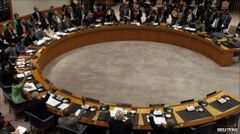United Nations Security Council Resolution 1973
 Ten states supported, five abstained | |
UNSCR 1973 was adopted by the United Nations Security Council on 17 March 2011 in response to unrest in Libya and was proposed by France, Lebanon, and the United Kingdom.[1]
Ten Security Council members voted in the affirmative (Bosnia and Herzegovina, Colombia, Gabon, Lebanon, Nigeria, Portugal, South Africa, and permanent members France, the United Kingdom, and the United States). Five (Brazil, Germany, and India, and permanent members China and Russia) abstained, with none voting against.
UNSCR 1973 formed the legal basis for military intervention in the Libyan Civil War, demanding "an immediate ceasefire" and authorising the international community to establish a no-fly zone and to use all means necessary short of foreign occupation to protect civilians.[2]
Opposed by China
On 18 March 2011, the Times of India reported that China was opposed to the UN resolution for creating a no-fly zone over Libya.
- "Considering the concern and stance of Arab countries and the Africa Union as well as the special situation in Libya, China and some countries abstained from voting on the draft resolution," foreign ministry spokeswoman Jiang Yu said in a statement on Friday.
- "We oppose the use of force in international relations and have some serious reservations with part of the resolution," Jiang said. The crisis in Libya should be resolved through dialogue and other peaceful means, she said.[3]
Related Document
| Title | Type | Publication date | Author(s) | Description |
|---|---|---|---|---|
| Document:World War and the Russia-China Veto | Article | 10 February 2012 | Carla Stea | A discussion of the unrest in Syria. It goes on to detail the appalling and ongoing abuses of human rights in post-Gaddafi Libya - the direct result of the 2011 UNSCR 1973, and the military action it was deemed by NATO to authorise. These abuses, carried out by NATO installed proxies, arguably worse than anything happening in Syria, are a stark warning of what Syrians can expect should NATO succeed in its agenda of "Regime change". |
References
Wikipedia is not affiliated with Wikispooks. Original page source here